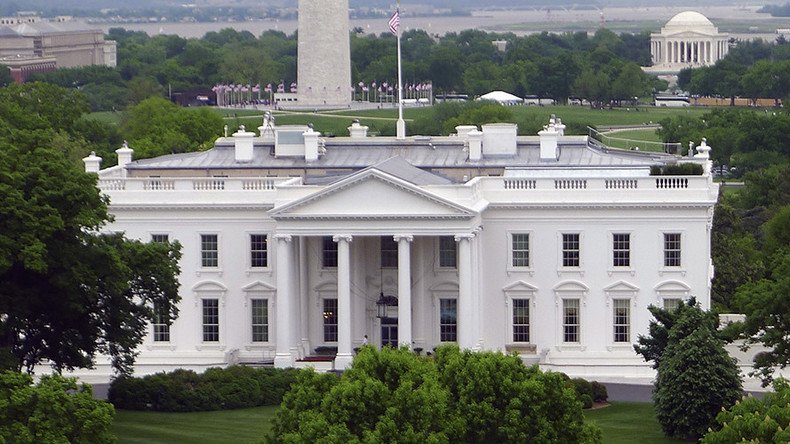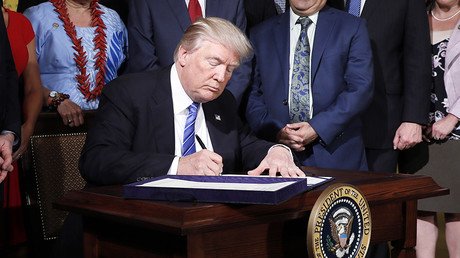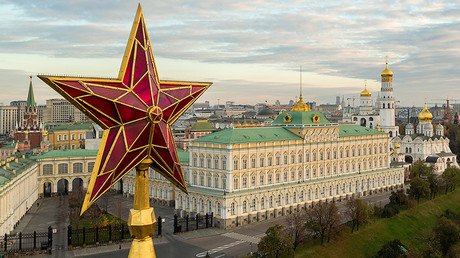Trump: Newly signed Russia sanctions law ‘seriously flawed’

US President Donald Trump says the Russian sanctions law he signed into force is "seriously flawed" and includes unconstitutional provisions that usurp presidential authority.
"Today, I have signed into law HR 3364, the 'Countering America's Adversaries Through Sanctions Act.' While I favor tough measures to punish and deter aggressive and destabilizing behavior by Iran, North Korea, and Russia, this legislation is significantly flawed," Trump said in a statement released by the White House.
In its haste to pass the legislation, Congress "included a number of clearly unconstitutional provisions," Trump said.
The biggest problem with the bill is that it "encroaches on the executive branch’s authority to negotiate," which will make it harder for the US to strike good deals and will "drive China, Russia, and North Korea much closer together," according to the president.
"Congress could not even negotiate a healthcare bill after seven years of talking," Trump said, taking a dig at last week's failed, unrelated attempt to repeal and replace the Affordable Care Act, better known as Obamacare. The deciding vote against the repeal bill was Senator John McCain (R-Arizona), a major supporter of the anti-Russian sanctions.
"Yet despite its problems, I am signing this bill for the sake of national unity," Trump said. "It represents the will of the American people to see Russia take steps to improve relations with the United States. We hope there will be cooperation between our two countries on major global issues so that these sanctions will no longer be necessary."
Trump had little option but to sign the bill, as both legislative chambers passed it with veto-proof majorities. The Senate approved it by a vote of 98-2 on July 27 and the House of Representatives voted 419 to 3 in favor the day prior. If Trump had chosen to veto the bill, both chambers had more than the two-thirds votes necessary to override it.
Although he could have allowed the bill to become law by neither signing nor vetoing it, such inaction would have precluded a signing statement, which drew bipartisan condemnation on Capitol Hill.
Trump’s interpretation of the sanctions bill “raises serious questions about whether his administration intends to follow the law, or whether he will continue to enable and reward Vladimir Putin’s aggression,” House Minority Leader Nancy Pelosi (D-California) said in a statement.
Sen. Cory Gardner (R-Colorado), who played a key role in crafting the sanctions bill, also expressed concern about the signing statement.
.@POTUS signing Russia sanctions bill was the right thing to do, but his statement shows Congress needs to keep a sharp eye on this Admin.
— Chuck Schumer (@SenSchumer) August 2, 2017
“Look, whether it was President [George W.] Bush, President [Barack] Obama, or President Trump, I’ve never been a fan of signing statements,” said Gardner, according to Politico. “I think they’re a way for any president to usurp the role of the legislative branch. And that’s why I’ve always been concerned, regardless of who issued them, on any matter.”
Moscow has already responded to the sanctions, ordering the US to reduce its diplomatic staff in Russia by 755 people.
The newly-signed sanctions law has placed a “heavy toll” on relations between the US and Russia, Konstantin Kosachev, the head of the Foreign Affairs Committee in the Russian Federation Council has said. He told RT that “the consequences of the implementation of this law will surely be felt in the US-Russian relations for years or even for decades.”
He also said the law completely deprives the US sanctions policy of any flexibility as “any changes in it [aiming at] its liberalization would be possible only through making amendments to the law.”
Kosachev also said the law puts Trump into “subordinate position” in relation to Congress “for the first time in the history of the US presidency.”
By signing the sanctions bill into the law, Trump “openly admitted that he is weaker than Congress in the field of the sanctions policy and is unable to counter it,” Kosachev said, adding, that Trump apparently “just gave up.”
Speaking about the actions of the Congress, the Russian senator said that Trump’s adversaries managed to rally other lawmakers and reach bipartisan consensus, with Trump effectively unable to exercise his presidential powers. Now, they are seeking to “either make him a ceremonial president or to provoke him to take actions that could serve as a formal trigger for his impeachment.”














